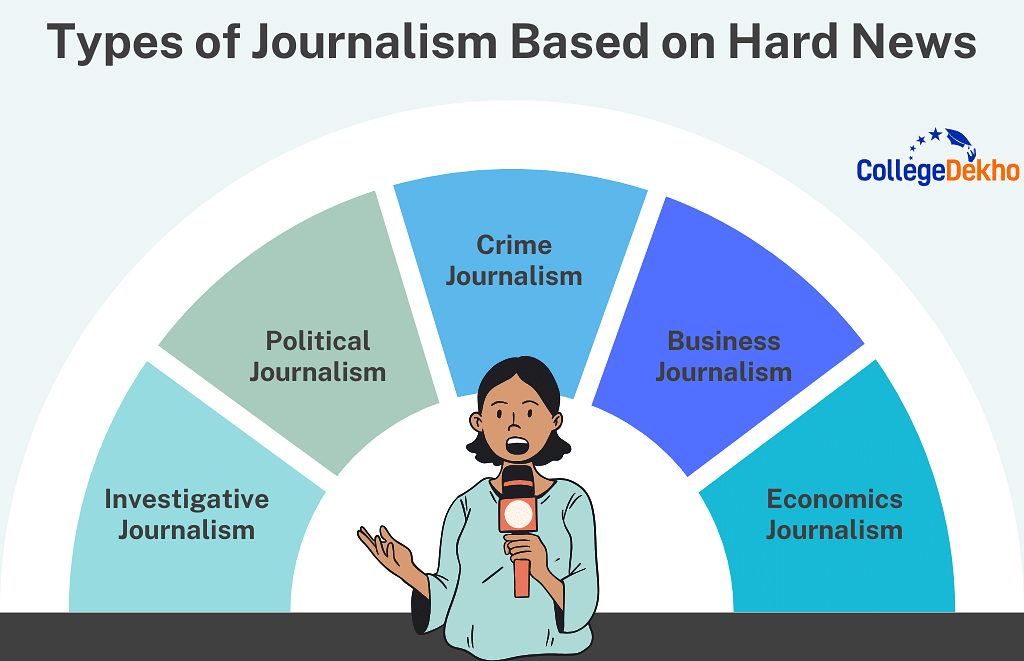The 10 different types of journalism include Photojournalism, Broadcast Journalism, Investigative Journalism, Sports Journalism, Business Journalism, Print Journalism, Tabloid Journalism, Entertainment Journalism, Political Journalism, and Crime Journalism. Explore each one to find your passion!
- What is Journalism?
- 10 Most Popular Types of Journalism in India at a …
- Types of Journalism: Hard News
- Types of Journalism: Soft News
- Types of Journalism Based on the Medium of Delivery
- Eligibility for Different Types of Journalism Courses
- Top Journalism Courses in India
- Top Colleges Offering Different Types of Journalism
- Syllabus for Different Types of Journalism
- Faqs

Journalism today offers a wide range of opportunities as the field continues to grow rapidly with digital media expansion. As someone exploring this career, it’s important to understand the different branches that make journalism such a dynamic profession. The major types include investigative, photo, broadcast, print, political, business, sports, entertainment, tabloid, and crime journalism.
Each category plays a specific role in shaping public awareness and connecting communities with real stories. Investigative journalism digs deep into hidden facts, while broadcast journalism delivers instant news to viewers. Sports and entertainment journalism engage massive audiences through storytelling, and business journalism provides insights into the financial and economic world. With global media trends shifting toward visuals and real-time updates, fields like digital photojournalism and multimedia reporting are gaining immense relevance. No matter your interest, there’s a specialised path in journalism that blends creativity with purpose.
Explore different types of journalism to find where your passion lies!
Also Read :
What is Journalism?
10 Most Popular Types of Journalism in India at a Glance
Various types of Journalism can be grouped into certain categories to help us understand them better. However, it should be noted that all types of Journalism come under the bigger umbrella of Mass Communication, as do most Journalism courses. Let's understand various types of Journalism categories.
Type of Journalism | What It Covers | Skills Required | Best For |
|---|---|---|---|
Investigative Journalism | Exposing corruption, scandals | Research, interviewing, analytical | People who love digging deeply and solving mysteries |
Political Journalism | Government, elections, policies | Critical thinking, clear writing | Those interested in politics and public affairs |
Business Journalism | Markets, companies, economic trends | Financial literacy, data analysis | People who enjoy economics and finance |
International Journalism | Global news, foreign affairs | Cultural knowledge, languages | Those curious about world events |
Crime Journalism | Criminal activities and justice system | Attention to detail, interviewing | Those fascinated by law and order |
Lifestyle Journalism | Fashion, food, health, travel | Creativity, trend awareness | People interested in culture and trends |
Entertainment Journalism | Celebrities, movies, music | Networking, storytelling skills | Those who love pop culture and entertainment |
Sports Journalism | Sports events and personalities | Sports knowledge, quick reporting | Sports fans who love live event coverage |
Scientific Journalism | Scientific discoveries and research | Ability to simplify complex info | Those with a science background or curiosity |
Photojournalism | News stories through photographs | Photography skills, visual storytelling | Creative individuals with camera skills |
Types of Journalism: Hard News
Hard news and soft news are broadly classified based on the kind of information they provide. Hard news mostly includes serious factual stories about politics, current affairs, government, crime, and business.

Investigative Journalism: Investigative Journalism involves objectively uncovering the hidden truth or facts on a given matter, person, topic of interest, or event. An investigative journalist finds the facts by studying cases that require much effort. They expose scandals for propaganda by making headlines. Due to the complex procedure, a single case can sometimes take months to years to finish. So, to become a successful investigative journalist, one must possess knowledge, patience, and persistence. There are several colleges offering investigative journalism courses.
Political Journalism: This is considered one of the serious types of Journalism. The field of political Journalism can be broken down into three categories: international political news, national political news, and local political news. A journalist whose niche is political news must have an in-depth knowledge of political events, political figures, bodies, election campaigns, policies, their impact, and the aftermath and then report the news unbiasedly. A political journalist needs to deliver a piece of information to the audience without impacting it due to a personal opinion. So, it would not be too much to say that being a political journalist is a tough and risky job because if your news is hindered by your personal opinions, it can make you look bad in common people.
Crime Journalism: A crime journalist writes and researches criminal events for media outlets like newspapers, television, magazines, or other platforms. The journalists conduct interviews and also attend court hearings. From murder to some manipulation in the stock market, anything against the code of law is a criminal offence. So, a crime journalist covers all kinds of crimes, be it a mysterious homicide or money embezzlement at an MNC.
Business Journalism: Free flow of communication between two businesses or companies is healthy for a country’s economy. Because of this communication, the economy remains highly interlinked. For instance, a finished product of one company could be used as a raw material at another company. Policies adopted by a major organisation can affect a huge part of the economy. A merger of two giants can impact the turnover of many small organisations. So, to promote all of this, a business journalist delivers information on business news. These journalists talk about the stock market, big mergers, stakeholders, etc.
Also Read : Why Skills Matter as Much As a Degree in Journalism
Types of Journalism: Soft News
Soft news covers less serious issues like celebrities, arts, sports, and culture. Check out the types of Journalism based on soft news below.

1. Arts Journalism
This type of Journalism is for people who love art. Arts Journalism covers various forms of art, such as music, dance, films, literature, painting, drama, poetry, etc. An arts journalist analyses trends in the art world and shares the information with a related audience. Since art Journalism is quite popular amongst the audience, many news agencies hire art journalists to gather news in the field.
2. Celebrity Journalism
It is one of those types of Journalism that has been very popular. The word ‘paparazzi’ has become very well-known in the past few years. This term is designated to celebrity journalists. A journalist in this field works to gather information on celebrities about their personal lives, movies, shows, or public appearances. A celebrity journalist also interviews celebrities and reports gossip, as fans always want to know what is happening in the lives of the people they admire. A large number of the audience enjoys watching and reading about their favourite celebrities.
3. Education Journalism
Education Journalism deals with reporting on different developments and events happening in the field of education. These educational Journalism reports help a policymaker to implement new education policies when needed. The main focus of an education journalist is to increase awareness about the education system and to encourage students to opt for higher education. Usually, the target group for educational Journalism is students, researchers, and teachers.
4. Sports Journalism
As the name suggests, a sports journalist covers news related to a sports series, event, or a sportsperson. This type of journalism comes with additional perks like watching live sports events and travelling to different places, and it even provides you with the opportunity to meet and interview sportspeople. To work in this field, one is required to know about sports, be omnipresent, and have good communication skills.
5. Lifestyle Journalism
Another well-known form among the types of journalism is lifestyle journalism. In recent times, people’s interest in knowing about different lifestyles has increased. Lifestyle Journalism serves this purpose by delivering news related to leisure, music, cooking, gardening, entertainment, home decor, fashion, shopping, exercise, yoga, and healthy eating habits. This type of Journalism helps readers know the tips to lead a healthy and better lifestyle.
Also Read : BJMC vs BA Journalism
Types of Journalism Based on the Medium of Delivery
Based on the medium of news delivery, there are three Journalism categories: TV and Radio Journalism/ Broadcast Journalism, Print Journalism, and Online Journalism.
1. Cyber/ Online/ Digital Journalism
Cyber Journalism, also known as online/ digital Journalism, is the latest type of Journalism. As the name suggests, it deals with delivering content on different internet platforms. After the introduction of the World Wide Web (WWW) and the Internet, the whole world has become a virtual global village. With several easily accessible platforms, cyber or online Journalism has risen in popularity. Several channels dedicated to Journalism are followed on YouTube. Various TV and Print media houses have started going digital through blogs, websites, YouTube, and social media applications.
2. Print Journalism
This type of Journalism deals with delivering news through newspapers, magazines, etc. Since these media can hold the same news or information as other media, a journalist can work for both print and other media at the same time. Print Journalism is the most popular of all Journalism courses. Now, whether print Journalism is dying or not, only time will tell. But this topic has been in conflict for a long time now. The higher costs of material, lower subscription numbers, and the increment in other easily accessible media platforms have had a huge impact on print Journalism.
3. Broadcast/ TV/ Radio Journalism
It is one of those Journalism categories that deal with broadcasting news through television or radio. Both of these media are widely used and possess unique characteristics. A reason why TV Journalism is more popular than print Journalism is that it not only delivers news for the eyes but the ears. Audio-visual experience provided to the audience through TV Journalism engages them. This Journalism has large budgets and resources that help journalists create high-quality content. Unlike TV, radio includes much interaction with the target audience. However, it usually gathers a limited number of participants as the broadcasting is done live. Radio channels usually have smaller budgets than TV channels, causing limitations in covering fewer stories.
Eligibility for Different Types of Journalism Courses
For Certification Journalism courses, candidates must have passed 10+2.
For Diploma Journalism courses, candidates must have passed 10+2 with a minimum aggregate of 50% marks.
For PG Diploma Journalism courses, the students must have completed a diploma or an undergraduate Journalism course.
To enrol in UG Journalism courses, candidates must have passed 10+2 with a minimum of 55% marks and qualified for an entrance exam (if any).
To become eligible for PG Journalism courses, students must have successfully passed an undergraduate Journalism course with at least 50-55% marks and qualified for an entrance exam (if applicable).
Candidates completing a UG and PG Journalism course with a minimum of 50-55% aggregate marks and qualifying for a national or university-level entrance exam such as UGC NET, IIT JAM, etc., become eligible for Doctoral Journalism courses.
Top Journalism Courses in India
Name of the Course | Average Annual Course Fees |
|---|---|
Diploma in Journalism | INR 10,000 - 50,000 |
Diploma in Journalism and Mass Communication | INR 14,000 - INR 80,000 |
PG Diploma in Journalism and Mass Communication | INR 30,000 - INR 1,00,000 |
PG Diploma in Journalism | INR 13,000 - INR 90,000 |
PG Diploma in Broadcast Journalism | INR 12,000 - INR 1,00,000 |
BA Journalism | INR 30,000 - INR 1,50,000 |
BA in Journalism and Mass Communication | INR 50,000 - INR 2,00,000 |
BA (Hons.) Journalism | INR 20,000 - INR 1,00,000 |
BA English with Journalism | INR 20,000 - INR 1,00,000 |
BA (Hons) in Mass Communication and Journalism | INR 20,000 - INR 1,00,000 |
MJMC | INR 50,000 - INR 2,00,000 |
MA Journalism and Mass Communication | INR 50,000 - INR 3,00,000 |
Master of Communication & Journalism | INR 30,000 - INR 1,90,000 |
MA Broadcast Journalism | INR 20,000 - INR 1,00,000 |
MA Journalism | INR 50,000 - INR 3,50,000 |
Ph.D. Journalism and Mass Communication | INR 4,000- 1,20,000 |
MPhil Journalism and Mass Communication | INR 14,000- 1,20,000 |
Top Colleges Offering Different Types of Journalism
The most eminent colleges in India offering Journalism courses are as follows.
Name of the College | Courses Offered | Total Course Fee Range |
|---|---|---|
| INR 2,30,000 | |
| INR 10,000 - INR 30,000 | |
| INR 70,000 | |
Bachelor of Mass Media (BMM) | INR 2,90,000 | |
Bachelor of Mass Media (BMM) | INR 3,60,000 | |
| INR 5,00,000 | |
| INR 17,000 | |
Alliance School of Liberal Arts, Alliance University, Bangalore | B.A. in Media Studies (Journalism, OTT, Mass Communication) | INR 14,75,000 |
PG Diploma in Mass Communication | INR 22,000 | |
| INR 4,00,000 - 11,00,000 |
Syllabus for Different Types of Journalism
Check the table below to know about the syllabi for different specialisations under Journalism.
Types of Journalism | Syllabus |
|---|---|
Political Journalism |
|
Investigative Journalism |
|
Broadcast Journalism |
|
Business Journalism |
|
Print Journalism |
|
All types of journalism have their own way of functioning and challenges. Some require extreme focus and consciousness, whereas others are more relaxed. If you are preparing to choose journalism as your future, you might start preparing for some entrance exams to pursue journalism at reputed colleges. So, which type of Journalism suits you the best is up to your preferences.
Also Read:
If you want to apply for admission to the college of your choice, fill out our Common Application Form or dial the student helpline number 1800-572-9877 (toll-free ) and get the best advice on your career choices. If you have any doubts regarding Journalism courses, you can ask questions on the CollegeDekho QnA zone .
Are you feeling lost and unsure about what career path to take after completing 12th standard?
Say goodbye to confusion and hello to a bright future!

FAQs
You should first assess your career objectives and what you hope to accomplish in a role. This allows you to decide whether your aims align with the tasks and activities that journalists normally have. If you want to educate and aid the public, becoming a journalist could be a terrific alternative.
The top entrance exams for journalism courses include:
- AIMCET/GMCET
- IIMC Entrance Exam
- JMI Entrance Exam
- ACJ Entrance Exam
- XIC XET
- CUET
- MASCOM Entrance Exam
There are several types of journalism and there are subcategories for each major branch of journalism. The board categories in which journalism can be divided include:
- Print/Online Journalism: Includes articles, blogs for print, and online publications, like newspapers and magazines.
- Broadcast Journalism: Includes television or radio, and other forms of video or audio broadcast channels.
- Photojournalism: Mainly includes different types of photography and its related fields.
- Multimedia Journalism: It is a combination of written, broadcast, and photojournalism.
Some of the top colleges for journalism abroad include:
- Columbia University
- Cardiff University
- The University of Melbourne
- The University of Sydney
- Monash University
- University of Leeds
- University College London
- Western University
- McGill University
- The University of British Columbia
- New York University
- University of California
Yes, there are scholarships available for Journalism courses. Candidates can either appear for scholarship exams or they can apply for scholarships during admission to journalism courses. It must be noted that to avail scholarships candidates must have an excellent academic record and also have other accomplishments in academics.
Yes, journalism falls under Mass Communication. A variety of media, including journalism, public relations, advertising, film production, and management, are all included under the broad category of "mass communication." Although there are major differences between Journalism and Mass Communication, journalism seeks to enlighten the public about global news and current affairs. Mass communication on the other hand includes any channel or medium used to communicate to large audiences at the same time.
One of the most sought-after careers today is journalism. There are many ways to break into journalism, from writing for publications like newspapers and magazines to reporting on programs like TV and radio. The following are some of journalism's most lucrative specialties:
- Broadcast Journalism
- Photo Journalism
- Public Relations and Advertising
- Media Arts
- Radio, TV, and Digital Broadcasting
- Communication and Media Studies
- General Journalism
- Digital/Online Journalism
- Tabloid Journalism
- Mobile Journalism
Graduates with degrees in journalism can choose from a wide range of jobs. Programs in journalism offer career opportunities in both the public and private sectors. Candidates can kickstart their careers from the very beginning in the field of Journalism if they have the right plan and have chosen the type of journalism suited for them. Here is a list of some of the entry-level job positions and career options available to journalism graduates in India:
- Public Relations Officer
- Media Journalist
- Investigative Journalist
- Radio Jockey
- Editor
- Content Writer
- Content Curator
There are several colleges in India that offer excellent Journalism courses to aspirants. Some of the top colleges offering Journalism courses are:
- St. Xavier's College (Autonomous)
- Indian Institute of Mass Communication
- Telecom Management.
- Jamia Millia Islamia
- Christ University
- Chandigarh University
- Symbiosis Institute of Media & Communication AND Symbiosis Institute of
- Film and Television Institute of India
- Banaras Hindu University
With a degree in journalism, students are equipped to work as journalists or pursue careers in print journalism, advertising and promotion, marketing and management of mass communication, public relations, corporate communication, broadcast journalism, and media management. Jobs are available for graduates of the BA Hons. in Journalism program in both the public and private sectors.
As with any other academic course, candidates must meet the requirements for Journalism courses in order to enroll in them. The following are the requirements for enrolling in journalism courses:
- Candidates have to secure 50% in Class 12th in any stream to be considered eligible to apply for the Journalism courses.
- Admissions for Journalism courses are often done based on entrance test scores conducted by universities and colleges across the country. Direct admissions are also offered by some institutions.
Was this article helpful?




















Similar Articles
Free Public Speaking & Communication Skills Courses
Top 10 Film & Media Studies Online Courses
Best Free Journalism Courses with Certificates
Top 10 Mass Communication Courses for Students
List of CUET 2025 Subjects for BA Journalism
XIC OET 2025 Exam Day Guidelines